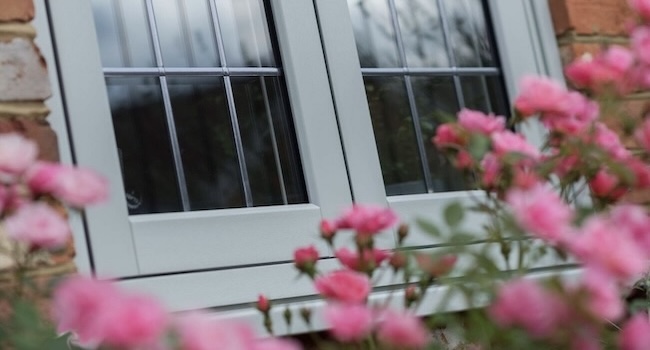Triple glazing aluminium and uPVC windows that deliver superior results.
For state-of-the-art thermal insulation, look no further than triple-glazed windows. Why? There’s a growing number of homeowners choosing over double glazing, especially for period property renovations.
Deciding between double and triple glazing is difficult because it comes with a higher price tag but, for many in the UK, the benefits outweigh the costs following trends set by colder countries such as Scandinavia and Denmark.
Request a free, no-obligation quote
Benefits
- Energy efficiency, triple glazing outperforms even the highest spec double glazed windows offering lower u-values and better energy efficiency.
- Temperature regulation. During winter it does a better job of keeping the cold out and prevents the escape of heat. In summer, they help to keep your home cooler as they stop heat from coming in.
- It can help with noise control when acoustic glass is used in windows are particularly effective at keeping noise out of your home.
- Added value, depending on where you live and other factors related to your home, triple glazed windows can add value to your property.
- Increased security, triple glazed windows are very difficult to break and, if correctly installed in a uPVC or aluminium frame, make it very difficult for intruders to gain access to your home.
Triple Glazed uPVC and Aluminium Window Options
As homeowners strive to make their homes more energy-efficient without compromising on the traditional look of the property, it has become an effective tool. Most are conscious of preserving the classic aesthetic of their home but understand that advances in window technology mean that it is now possible to have the best of both worlds.
Windows that may need to be upgraded in a period home include casement windows, popular during the 20th century, and sash windows used most often in Victorian and Georgian homes. With triple glazing options for upgrading these window types, energy efficiency and classic good looks go hand in hand.
uPVC and aluminium, along with timber, are the two most commonly used materials for housing triple glazed frames. Among the top choices on the market in the UK are:
- Halo Rustique uPVC windows
- Halo System 10 uPVC windows
- Halo Flush Sash uPVC windows
- R7 uPVC windows
- R9 uPVC windows
- Schuco aluminium windows
- Smarts aluminium windows
Each offers excellent quality and craftsmanship, and the right choice for you will depend on personal preference, as well as the parameters of the specific property.
With leading frame brands such as Halo, Residence, Schuco and Smarts continuing to improve and refine their ranges, it’s no surprise that installing triple glazed uPVC or aluminium windows is a stress-free way to add energy efficiency, style and value to your home.
Frequently Asked Questions
What is triple glazing?
The sealed units are made up of three panes of glass sealed in a unit and placed within a frame. The main difference between triple glazed and double-glazed windows is, therefore, the number of panes.
Like double glazed windows, the gaps between the three panes are filled with argon gas (or xenon or krypton) which makes the windows more effective at keeping out cold and noise because it is heavier than air.
The third pane of glass contained in a triple glazed unit is placed halfway between the outer pane and the inner pane, thereby creating two airlocks which vastly improves the energy performance of the unit.
To boost energy efficiency further, triple glazed glass usually incorporates warm edge spacer bars. These are used around the perimeter in order to decrease thermal bridging. The manufacturer may also opt for a coating on the glass to reduce the amount of heat energy lost from inside.
Keep in mind that the performance of the glass is impacted by the surrounding frame, so it’s important to look at the energy efficiency ratings of both the glass and the frame together. Recent advances in uPVC and aluminium frames mean that it’s now possible to get high-efficiency frame options in both types of materials for superior thermal performance.
How long do triple-glazed windows last?
A fair estimate would be 20 years. However, the lifespan can vary from 10 years to 35 years, depending on where you live and how well the windows are installed and cared for.
What’s the difference between triple glazing and double glazing?
The main benefits of triple glazing are those of energy efficiency and noise reduction. Overall, homeowners rely on triple glazed windows to reduce cold spots in the home, condensation and draughts, making the home overall more comfortable.
Is triple glazing better than double glazing?
Triple glazed windows are about 40% more thermally efficient than double glazing, so the energy savings are significantly more. If you opt for triple glazed windows and doors, you’ll also cut down on cold spots and draughts.
The other thing to consider is that triple glazing also offers superior noise reduction compared to double glazed and single glazed glass.
Learn more about double glazing
Can I upgrade double glazing?
Because double glazing is very similar to triple glazing, it is usually easy to replace one with the other, and the costs are likely to be lower than you think. The only restriction is the type of frame that has been used as some older frame types can’t accommodate triple glazed units.
Work with leaders in the manufacture, supply and installation of windows in the UK.
If you’re thinking about renovating or upgrading your home, don’t leave your window choice until later. Different frames and glass types will have a significant impact on thermal performance, which can negatively impact your home’s energy efficiency.
If you’d like to chat with one of our friendly, knowledgeable experts, please fill in the form or give us a call on XX. We look forward to helping you with your home renovation or new build project!

